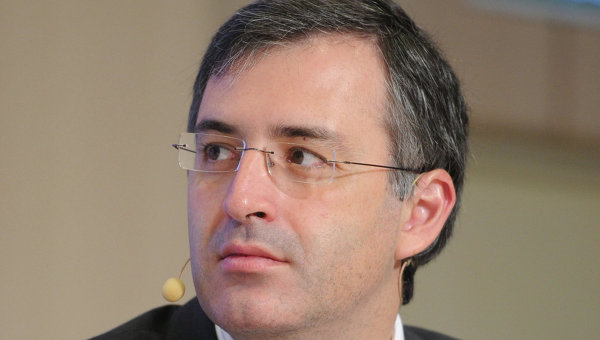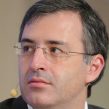
Russia’s Predicament and the Plight of One Economist
Publication: Eurasia Daily Monitor Volume: 10 Issue: 104
By:

The Russia–European Union summit opens today (June 3) in Yekaterinburg, according to the twice-yearly schedule and amidst mutual irritation and disappearing expectations. Quarrels about the Syrian calamity are unavoidable. The talks will likely be fruitless, with Moscow expressing disappointment over the EU’s lifting of the arms supply embargo and Brussels protesting against the Kremlin’s planned deliveries to the Syrian government of Russian weapons, including the MiG-29M fighters (Kommersant, June 1). Both sides will half-heartedly promise to overcome the deadlock in advancing visa-free travel; but for Moscow, the issue of introducing a visa regime for labor migrants from Central Asia has acquired far greater urgency (Moskovsky Komsomolets, May 30; Gazeta.ru, May 16). Energy dialogue, which used to be the backbone of the partnership, is depressed not only by the contracting natural gas demand in the EU, but also by the European Commission’s probe into Gazprom’s supply-side abuses, while the Russian gas “champion” refuses to accept the legitimacy of this investigation (Nezavisimaya Gazeta, May 31). Discussions of financial flows, which could have been useful for fine-tuning the agenda of Russia’s chairmanship of the G20, have gone sour since the culmination of the Cyprus banking crisis.
The increasingly skeptical economic assessments and negative public opinion on Russia in Europe have been confirmed last week by an episode, which might appear trivial but in fact richly deserves every headline it has produced. Sergei Guriev, the rector of the New Economic School (NES), has resigned from this position and opted to stay in Paris with his family (RIA Novosti, May 29). The resonance of this personal choice, determined by the very real risk of arrest, cannot be explained by Guriev’s solid professional reputation or by the high standard of education in the NES, where President Barack Obama gave a lecture while visiting Moscow in July 2009 (RBC Daily, May 30). Guriev sought to utilize his expertise for providing recommendations for the government aimed at improving Russia’s economic performance, and his plight is seen by all liberal-minded professionals as proof of the senselessness of their efforts to design reforms for the un-reformable regime (Kommersant-FM, May 31).
Guriev’s trouble stemmed from two politically-loaded criminal investigations: The old one against dissident-oligarch Mikhail Khodorkovsky and the new one against corruption-exposing blogger Alexei Navalny. The logic tying the latter case to Guriev’s fall is plain and simple. The court in provincial Kirov is about to send Navalny to jail on a crudely fabricated accusation, so his supporters and contributors to his anti-corruption crusade, including Guriev, must be silenced (New Times, May 27). The former case is more complicated because a new case against Khodorkovsky, who is due to complete his sentence in 2014, has not been opened as yet; but the conclusion of a group of experts on the fraudulence of the previous case must be disproved, and Guriev was a member of that group (Novaya Gazeta, May 31). Moreover, several Russian state-owned companies, including Rosneft, are facing proceedings in European courts that highlight the lack of legal property protection in Russia, so Guriev and his colleagues were put under “gentle” pressure, including searches and interrogations, in order to convince them to take a more “patriotic” view regarding this issue (Moscow Echo, May 31).
This case not only fits into the larger pattern of tough persecution of dissent and discontent but also reflects the growing hostility of Russia’s political masters toward economic expertise. Guriev is, in fact, a moderate among the economists, who tends to spell out disconcerting predictions about the trajectory of stagnation, so that no amount of official forecasts of strong growth can restore business confidence. Even the Russian Audit Chamber has expressed doubt in the government’s guidelines for ensuring the acceleration to 4-percent growth of GDP in 2015, while current assessments point to a figure of 1.6 percent in 2013 (Gazeta.ru, May 31; Nezavisimaya Gazeta, May 30). Russia’s stock market has diverged from key world indices and vacillates at the level some 30 percent lower than in mid-2011, paying scant attention to doctored statistics but responding nervously to the expansion of supply on the global energy markets (Novaya Gazeta, May 31). Former Finance Minister Alexei Kudrin argues that badly overdue economic reforms are blocked by the populist political course, including the massive rearmament program (Kommersant, May 30).
Kudrin’s opinion still carries weight, and the head of Sberbank, German Gref, expressed much similar concerns at the annual meeting of this largest state bank, which produced a small sensation by reelecting the fallen-from-grace Guriev to its board (Kommersant, June 1). This expression of solidarity among the extra-cautious financial elite signals their anxiety about the direction of economic policy, which is far detached from reality and is informed by wishful thinking, political expediency and conspiracy theories (Gazeta.ru, May 31). President Vladimir Putin is watching the moods among the bankers and top bureaucrats for signs of disloyalty and seeks to keep them in awe by cutting short public discussions with stern reminders “not to interrupt me ever again” (Kommersant, June 1). He focuses on social programs and dismisses the far-fetched propositions of “modernization” entertained by his junior partner Prime Minister Dmitry Medvedev. But the emphasis on state investments and budget subsidies produces diminishing returns, while Medvedev’s inability to protect the “modernizers,” including Guriev, only pushes further aggravates the discontent among the elites (Vedomosti, May 31).
Putin believes that the malcontents expelled from the Kremlin prefer to look for greener pastures in the West rather than join the radicalized “white opposition,” and that the motley crowd of the latter will fail to connect with the angst among the “dispossessed,” who tend to mistrust affluent liberals. This fragmentation of the opposition gives Putin confidence to confront his European peers. The Russian president assumes that the EU is so troubled by the recession that its ability to execute anything resembling a common foreign policy or, for that matter, energy policy is severely undercut. Oppressed by his siloviki and looted by his courtiers, Russia is indeed becoming a distinctly non-European country, but that does not mean that it has a future outside the “house” of democratic norms and values. It also does not mean that raising human rights issues with Putin is pointless for pragmatic Western politicians; he, after all, will not remain in power forever.




